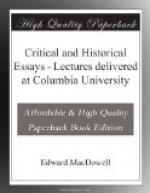We remember that Auber never stirred out of Paris throughout his long life. It was an article in the Gazette Musicale of Paris which was instrumental in calling Gounod back into the world from his intended priestly vocation. And this influence of the admittedly ignorant and superficial French public is the more remarkable when one considers the fact that it was always the last to admit the value of the best work of its composers. Thus Berlioz’ fame was gained in Russia and Germany while he was still derided and comparatively unknown in Paris.
The failure of Bizet’s “Carmen” is said to have hastened the composer’s death, which took place within three months after the first performance of the opera. As Saint-Saens wrote at the time, in his disgust at the French public: “The fat, ugly bourgeois ruminates in his padded stall, regretting separation from his kind. He half opens a glassy eye, munches a bonbon, then sleeps again, thinking that the orchestra is a-tuning.” And yet, even Saint-Saens, whose name became known chiefly through Liszt’s help, and whose operas and symphonies were given in Germany before they were known in France, even he is one of the most ardent adherents to the “anti-foreigner” cry in France. In my opinion, this respect for and attempt to please this grossly ignorant French public is and has been one of the great devitalizing influences which hamper the French composer.
Charles Gounod was born in 1818, in Paris. His father was an engraver and died when Gounod was very young. The boy received his first music lessons from his mother. He was admitted to the Conservatoire at sixteen, and studied with Halevy and Lesueur. In 1839 he gained the Prix de Rome, and spent three years in Rome, studying ecclesiastical music. In 1846 he contemplated becoming a priest, and wrote a number of religious vocal works, published under the name Abbe C. Gounod. In 1851 the article I referred to appeared, and such was its effect on Gounod, that within four months his first opera “Sapho” was given (April, 1851). A year later this was followed by some music for a tragedy (Poussard’s “Ulysse” at the Comedie Francaise), and in 1854 by the five-act opera “La nonne sanglante.” These were only very moderately successful; and so Gounod turned to the opera comique, and wrote music to an adaptation of Moliere’s “Medecin malgre lui.” This became very popular, and paved the way for his “Faust,” which was produced at the Opera Comique in 1859. In the opera comique, as we know, the singing was always interspersed with spoken dialogue. Thus, this opera, as we know it, dates from its preparation for the Grand Opera ten years later, 1869. Ten months after “Faust” was given he used a fable of Lafontaine for a short light opera, “Philemon and Baucis.”




